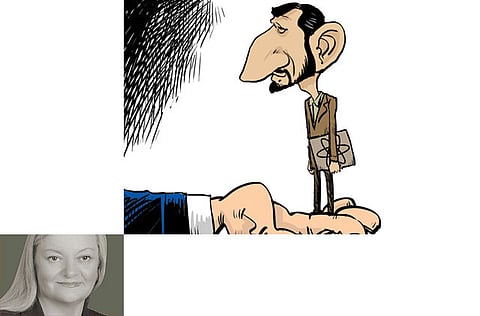US favours diplomacy on Iran nuclear issue
Obama and his new pragmatic government colleagues may be taking the line ‘if you can’t beat ‘em, join ‘em’

US President Barack Obama’s policy towards Iran has undergone subtle changes in his second term causing consternation in President Benjamin Netanyahu’s hawkish circle. Officially US military intervention to prevent Iran from building a nuclear bomb remains on the table but there’s little appetite for war in the White House or the State Department and the Pentagon. America’s tone changed when Vice-President Joe Biden announced the US is open to meeting bi-laterally with the Iranian leadership, a proposal that Obama was mulling early in his first term.
“You pull away the gun from the face of the Iranian nation, and I myself will enter talks with you,” responded the Iranian President Mahmoud Ahmadinejad, who admitted US and EU anti-Iranian oil, trade and banking sanctions were hurting. And if Congress has its way, proposed new sanctions amounting to a bar to commercial trade would bite even harder.
Iranian officials don’t sound intimidated. In February, Iran announced that it had found significant uranium deposits and would expand its nuclear capability with 16 new nuclear power stations, earlier it announced it was upgrading its Natanz plant with centrifuges up to three times faster than those currently installed. There is a wealth of evidence that Iran is collaborating with North Korea on satellite, missile and nuclear technologies.
America’s new Secretary of State John Kerry, although staunchly pro-Israel, is fairly dovish when it comes to Iran. Last year, he made it clear that he favours diplomacy over conflict, expounded the view that the Iranian leadership will act rationally on nuclear issues and spoke of his desire to consolidate US-Iranian “common interests”.
Although the recently appointed US Defence Secretary Chuck Hagel toed the party line on Iran in his confirmation speeches, he slipped up when answering questions posed by the Senate Armed Services Committee by referring to the Iranian regime as “an elected government” and saying he supported Obama’s “strong position on containment”, drawing a quick riposte from former secretary of state Hilary Clinton who said, “As you know, our policy is prevention, not containment”. Judging by a speech Hagel made in 2007 he would welcome some type of US accommodation with Iran.
“In the Middle East of the 21st century, Iran will be a key center of gravity…a significant regional power,” he said. “The United States cannot change that reality. America’s strategic 21st century regional policy for the Middle East must acknowledge the role of Iran today and over the next 25 years…The United States must find a new regional diplomatic strategy to deal with Iran that integrates our regional allies, military power and economic leverage.”
Despite his anti-Iran sabre-rattling, Britain’s Prime Minister David Cameron has been reported as saying privately that Iran’s nuclear programme has passed the point of no return and the US, France and Israel should accept that Iran has the capability to produce nuclear weapons. He concludes that sanctions are meaningless in this context and might as well be lifted. A recently published opinion column written by Britain’s former foreign secretary Jack Straw and headed “Even if Iran gets the bomb it won’t be worth going to war” was well-timed and seemingly on-message.
Talks held in Kazakhstan last week between Iran and the P5+1 Nations (US, UK, France, China, Russia and Germany), the first since July 2012 that broke down, have apparently borne fruit primarily due to America’s willingness to compromise on its previous insistence that Iran’s below ground Fordo plant that produces 20 percent-enriched uranium should be shut-down. The US is now asking for the enrichment process at that facility to be put on hold and International Atomic Energy Agency monitors be permitted to do their jobs in exchange for a loosening of sanctions.
At the end of the discussions both sides sounded optimistic. Iran’s foreign minister went so far as to say that “a breakthrough was within reach”. Further talks are scheduled to be held in Istanbul on March 18 and negotiators will return to Kazakhstan for another round on April 5-6. That said there’s many a slip between the cup and the lip because Iran’s conservative hierarchy might be reluctant to inflame nationalist public opinion by agreeing to make concessions, especially prior to presidential elections scheduled for June this year. Likewise, Obama will have his work cut out explaining his watered down demands on Iran to Congress and the pro-Israel lobby.
Whether or not Iran and the West come closer together, the spectre of war is receding. The impotence displayed by the US and the EU vis-à-vis Syria has been a reality check. Russia would be just as obstinate over Western military intervention in Iran as it has been as regards Syria. Moreover, any attack on Iranian nuclear sites would elicit massive retaliation against Israel and Western interests/bases in the Gulf. In any event, US and other Western economies are too fragile to overcome the spike in oil prices that such a conflict would propel. Even Netanyahu, still reeling from his loss of support and in the process of forming a government, is in no position to go it alone
The US and Israel have dragged their heels too long crying wolf and are in danger of losing the game. Netanyahu may be seething. Gulf States are concerned that a nuclear-armed Iran would leave them vulnerable. But it seems that Obama and his new pragmatic government colleagues may be taking the line ‘if you can’t beat ‘em, join ‘em.
Linda S. Heard is a specialist writer on Middle East affairs. She can be contacted at lheard@gulfnews.com
Sign up for the Daily Briefing
Get the latest news and updates straight to your inbox


